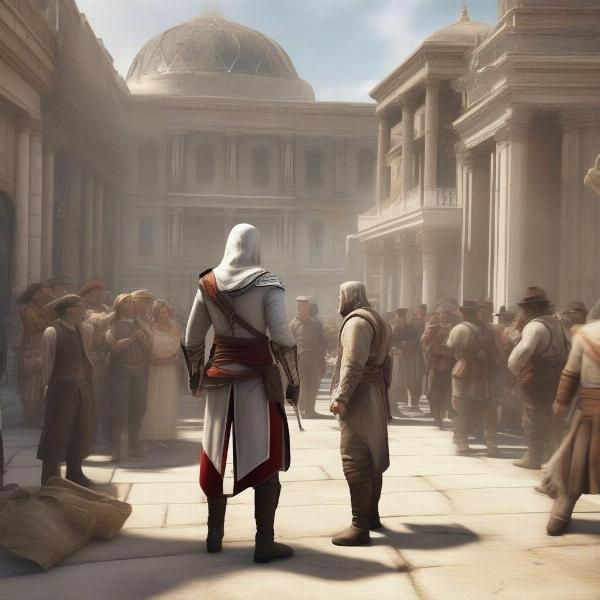The age-old question: are Assassin’s Creed games historically accurate? While the franchise thrillingly blends historical settings with fictional narratives, the line between fact and fiction can be blurry. Let’s delve into the historical accuracy of the Assassin’s Creed universe, exploring its strengths and limitations.
Fact vs. Fiction: Deciphering the Assassin’s Creed Timeline
The Assassin’s Creed series takes players on a journey through pivotal periods in history, from the Crusades to the American Revolution and beyond. While the games strive for visual and cultural authenticity, they also take liberties with historical events and characters to serve the overarching narrative. This begs the question: how much of what we see is rooted in reality, and how much is artistic license? The core premise, the age-old conflict between the Assassins and Templars, is fictional. However, this fictional conflict is woven into the tapestry of real historical events and features interactions with historical figures. This creates a compelling blend of fact and fiction, offering a unique lens through which to explore the past.
The Historical Accuracy of Assassin’s Creed Settings and Characters
Assassin’s Creed excels at recreating historical environments. The developers meticulously research architectural details, city layouts, and social customs to create immersive worlds that evoke a sense of place and time. From the bustling streets of Renaissance Florence to the vast landscapes of ancient Egypt, the games capture the essence of these historical periods. However, this accuracy isn’t always consistent. While some buildings and locations are faithfully recreated, others are modified for gameplay purposes. Similarly, historical characters, while often portrayed with considerable accuracy in terms of appearance and personality, may have their roles in events exaggerated or altered to fit the narrative.
The Impact of Narrative on Historical Accuracy in Assassin’s Creed
The compelling narrative of Assassin’s Creed often requires deviations from historical fact. The need to create engaging storylines and incorporate gameplay mechanics can lead to alterations in the timeline, character motivations, and the unfolding of historical events. This doesn’t necessarily diminish the value of the games as historical experiences. Instead, it encourages players to delve deeper into the real history behind the fiction. By piquing their interest in a particular period or event, Assassin’s Creed serves as a gateway to further historical exploration.
How Assassin’s Creed Educates and Misleads about History
Assassin’s Creed, despite its fictional elements, can be a valuable tool for learning about history. The visual representation of historical settings, the introduction of key figures, and the portrayal of social customs can spark curiosity and provide a basic understanding of different historical periods. However, it’s essential to remember that the games are not documentaries. The fictional narrative can sometimes overshadow historical accuracy, leading to misconceptions or a romanticized view of the past.
 Assassin's Creed Historical Character Interaction
Assassin's Creed Historical Character Interaction
Do Experts Agree on the Historical Accuracy of Assassin’s Creed?
Historians and scholars have varying opinions on the historical accuracy of Assassin’s Creed. Some praise the games for their attention to detail and their ability to bring history to life for a wider audience. Others criticize the liberties taken with historical events and the potential for misinterpretation.
“While not a perfect historical record, Assassin’s Creed provides a compelling entry point for exploring historical periods, sparking curiosity and encouraging further research,” says Dr. Eleanor Vance, Professor of Medieval History at the University of Edinburgh.
“The games offer a visual feast, recreating historical environments with impressive detail. However, the fictional narrative can sometimes overshadow the historical reality,” notes Dr. James Riley, Historian and author of “Gaming Through History.”
Beyond the Animus: Further Exploring History Inspired by Assassin’s Creed
Assassin’s Creed provides a springboard for further historical exploration. By sparking interest in a particular time period or historical figure, the games encourage players to delve deeper into the real history. Numerous resources are available for those wanting to learn more, including books, documentaries, and academic articles. The games can be a starting point for a fascinating journey of historical discovery.
Conclusion: Assassin’s Creed: A Blend of History and Entertainment
So, are Assassin’s Creed games historically accurate? The answer is complex. While the games strive for historical authenticity in their environments and character portrayals, the fictional narrative often necessitates deviations from historical fact. It’s crucial to approach the series as a blend of history and entertainment, recognizing its limitations while appreciating its ability to bring the past to life in a compelling and engaging way. Are Assassin’s Creed games a replacement for history books? Certainly not. But they can be a powerful tool to inspire further learning and exploration. What historical periods do you want to explore further after playing Assassin’s Creed? Share your thoughts in the comments below!
FAQ
- What is the historical basis for the Assassin’s Creed storyline? The central conflict between Assassins and Templars is fictional, but it’s interwoven with real historical events and figures.
- How accurate are the historical settings in Assassin’s Creed? The games generally recreate historical settings with impressive detail, but some alterations are made for gameplay purposes.
- Can Assassin’s Creed be used as an educational tool for learning about history? Yes, but it’s essential to remember that the games are not documentaries and prioritize entertainment over strict historical accuracy.
- Do historians endorse the historical accuracy of Assassin’s Creed? Opinions vary among historians, with some praising the games’ immersive qualities and others criticizing the historical liberties taken.
- What resources can I use to learn more about the history featured in Assassin’s Creed? Numerous books, documentaries, and academic articles are available for those wanting to delve deeper into the historical periods depicted in the games.
- Which Assassin’s Creed game is considered the most historically accurate? This is subjective and depends on the specific criteria used for evaluation, but many consider Assassin’s Creed Origins and Odyssey to be among the most detailed in terms of historical setting and cultural representation.
- Does the fictional narrative of Assassin’s Creed detract from its historical value? While the fictional narrative can sometimes overshadow historical accuracy, it also serves to engage players and encourage them to explore the real history behind the games.

